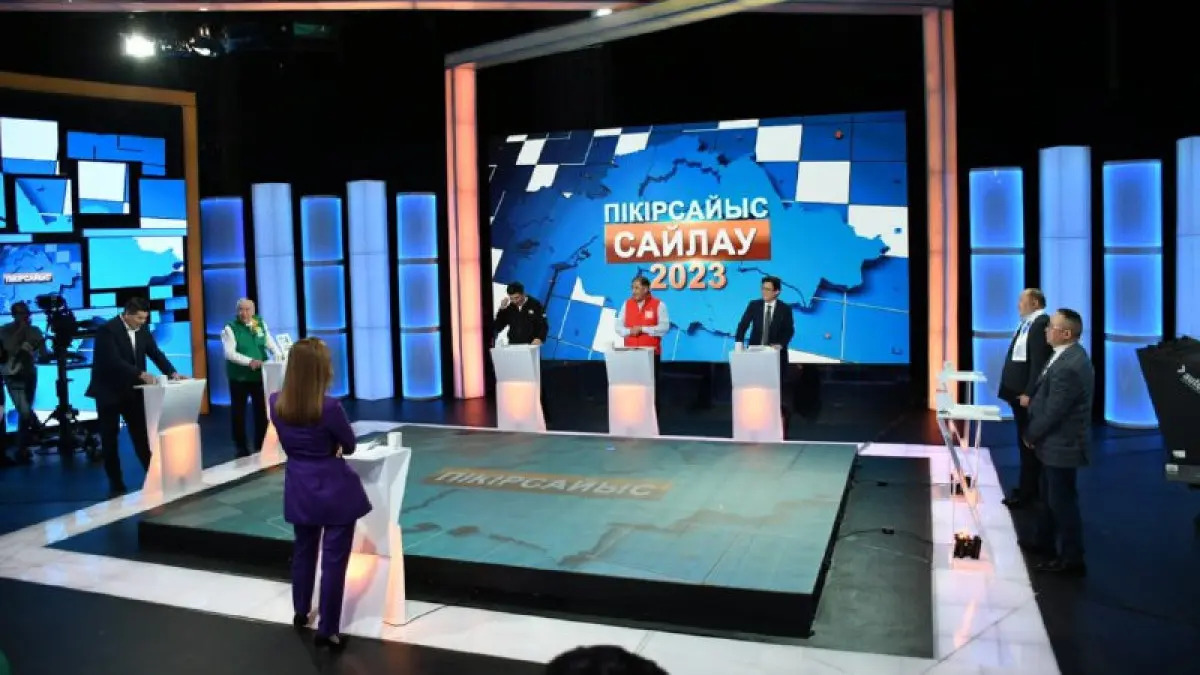ASTANA – Representatives of seven political parties debated live on Qazaqstan TV on March 1, offering their vision for the country’s future as election day for the Mazhilis, the lower house of Parliament, approaches.

Photo credit: Qazaqstan TV channel.
Participants included Berik Dyusembinov, deputy chair of the Aq Jol Democratic party, Yelnur Beisenbayev, executive secretary of the Amanat party, Zhiguli Dairabayev, deputy chair of the Auyl People’s Democratic Patriotic party, Azamatkhan Amirtai, chair of the Baytaq Green party, Askhat Assylbekov, deputy chair of the People’s party of Kazakhstan, Nurlan Auesbayev, chair of the Astana branch of the National Social Democratic party (NSDP) and Syrymbek Tau, co-chair of the Respublica party.
The four-round debates lasted 70 minutes. The first round focused on the main priorities of the parties’ election programs.
Dyusembinov of the Aq Jol party said his party’s goal is to return to free market conditions, produce tangible economic results, and minimize government participation. Businesspeople should take pride in what they do, he noted.
“Citizens who provide for the country must be strong and respected individuals. Tax authorities that harm businesses should be held accountable,” he said.
The Amanat party will focus on eliminating injustice, oligopolies and corruption, raising income, decreasing the age limit for retirees, and boosting social help, said Beisenbayev. He added the party would support the interests of children and youth.
Dairabayev from the Auyl party discussed steps to improve the country’s agricultural sector, the tax regime for agrarian workers, and the importance of elevating the status of working people who “provide food for the country.” The party will seek to ensure such people “have their honorable place in society,” he stressed.
Amirtai said Baytaq would put the protection of the environment and human health as the focal point of its program and concentrate on local self-government. If elected, the party will propose a draft law on local self-government to ensure the government hears the voices of those who live in villages.
Amirtai also mentioned the party created a people’s council in the Atyrau Region and implemented a pilot project based on local self-government. He said they now have the strength, knowledge, and experience to fully realize this project.
If elected, the People’s Party will prioritize forming a solid middle class and promoting justice, according to Assylbekov. He added justice should begin in the court and called for popular elections for district courts.
The party advocates for adopting a law to combat poverty, new tax reform designed by the party, increased social assistance for minors and a minimum wage.
“We demand that women retire at 58, the newlyweds be given temporary residence, and for mortgages to not exceed 3 percent,” he said.
Auesbayev said the National Social Democratic Party will concentrate on eradicating corruption, citing it as the greatest problem holding the country back and preventing it from addressing concerns such as medical care, housing, pensions, and wages.
“Problems are not being fixed. And our program has good proposals,” he added.
If elected, Tau said Respublica would focus on tackling the disparity in education and medium-sized entrepreneurship between cities and the countryside. “The government should support entrepreneurship in villages and develop good living standards for its residents,” he added.
In the second round, the participants responded to each other’s questions. Each participant had two minutes to respond before others could join the discussion. The Baytaq party did not participate in this segment.
In the third round, debate moderator Armangul Toktamurat challenged the participants to identify three issues they would try to resolve first if elected to the Mazhilis.
Dyusembinov said the parliament should have a say in approving and controlling the state budget. He also proposed that the majority party should form the government to increase its accountability before the parliament, and that the judiciary system should be improved.
Beisenbayev said his party will prioritize social equality, rule of law, the revival of villages and the agro-industrial industry, as well as promote the Kazakh language to consolidate the society.
Dairabayev focused on improving infrastructure in villages by ensuring good roads, water, gas, and internet, as well as adopting a law on food safety and stable management of the country’s agricultural sector with strict monitoring of the implemented programs.
Amirtai said his party will focus on the accountability of enterprises and officials for environmental pollution, revision of the Environmental Code, restoration of environmental science in Kazakhstan, and eradication of social inequality by assisting vulnerable citizens.
The People’s Party will prioritize social support for working people by providing a land plot for every citizen, as well as free education and medical care. The party would also focus on repossessing oligarchs’ property and returning illegally privatized enterprises to the state, as well as improving youth policy by providing housing and increasing student stipends.
Auesbayev said his party would first address assistance to the poorest citizens, eliminate the oligarchic system, and ensure control over the country’s resources by returning all illegally obtained assets to the people.
The Respublica party will aim to provide support to the youth in villages and cities by creating competitive conditions for qualified young people and providing decent wages to encourage young people not to leave abroad for work.
The parliamentary election will take place on March 19, with seven political parties and candidates in single-member districts competing for 98 seats in the Mazhilis and 3,415 seats in the maslikhats (local representative bodies).
The election promises to be competitive, with 283 party list candidates and 435 running in single-mandate districts for the Mazhilis alone. Campaigning will last until midnight on March 18. A total of 33.4 billion tenge ($72.5 million) is expected to be spent on the election.

